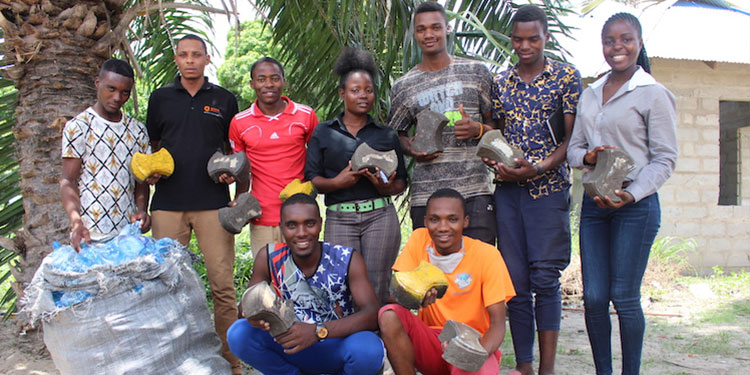
These environmental activists in Tanzania’s smoke-belching commercial city turn piles of recycled plastic wastes into building items in a move aimed at curbing rapid deforestation in the East African country by replacing wood with plastic materials.
PREYO’s other founder, Liberatha Kawamala, who left her logistics profession to follow her passion in environmental protection, is picking up mounts of discarded plastic waste that litter the natural environment in the bustling city and turning them into pavement slabs, plastic flowers and other building materials.
I always wanted to do something that would protect the environment and at the same time generate income, says Kawamala. Driven by her enthusiasm, Kawamala is striving to clean up piles of plastic waste littering the bustling city, creating jobs and saving trees.
As one of the fastest growing cities in Africa with the population of 4.4 million people, according to government statistics, Dar es Salaam is rapidly urbanising, straining its infrastructures and pushing 70 percent of its inhabitants into informal settlements that lack basic amenities and sanitation. A huge influx of people migrating from rural areas every day has exerted enormous pressure on the city’s dilapidated infrastructures, causing a number of problems such as poor handling of the plastic waste which litters landscapes, clog waterways, poisons marine life and threatens the very survival of many people.
According to Kawamala, the plastic-infused slabs, flowers and retaining blocks that her company makes is helping change the community’s mindset on plastic waste as people in the densely populated neighbourhood have already started using the recycled products for building purposes. “I am very impressed with the community’s response to our work. It motivates us to work even harder,” she told IDN
According to the country’s National Environmental Statistics Report of 2017, Dar es salaam generates more than 4,600 tonnes of waste per day and estimated that the volume is likely to rise to 12,000 tonnes by 2025. While collecting discarded plastic bottles is increasingly becoming a lucrative business, observers say that, by and large, city authorities lack a coherent strategy and mechanism for proper waste disposal. We cannot rely on small firms to manage the waste produced daily, the government must allocate enough resources to handle this problem, said Emrod Elisante, Professor of Environmental Engineering at the University of Dar Es Salaam.
The idea to establish PREYO came in early 2018 when Kawamala met Nyambi during an exhibition organised by United Nations office where they both demonstrated their skills in transforming plastic waste into useful building materials. After a brief conversation, they joined forces to achieve their goals and realise their dreams of productively using plastic waste to eke out a living.
Kawamala and a legion of her supporters enjoy working as a team, where some collect bottles and polyethylene bags while others prepare the kiln. According to Kawamala, one of the aims of the company is to prevent excessive use of sand for brick making since plastic blocks use less sand and thus help prevent soil erosion in Temeke District. She also points out that the 3.5 kg pavement slab her company produces costs 600 Tanzanian shillings (0.25 dollars) and is durable and water resistant.
One of the challenges the company faces is lack of a machine to filter smoke from the burning kilns. We are hoping to get a new machine which would solve the smoke problem once and for all, notes Kawamala. Because of the rising unemployment crisis among young people in Tanzania, Kawamala said the company will be positioned in the future to offer job opportunities to hard-working youths. PREYO currently offer to pay the equivalent of 0.12 dollars for each kilogram of plastic bottles collected.
The company now produces 100 slabs and 40 to 60 plastic masts a day, but hopes to increase to at least 200 slabs once it acquires a better processing machine.
